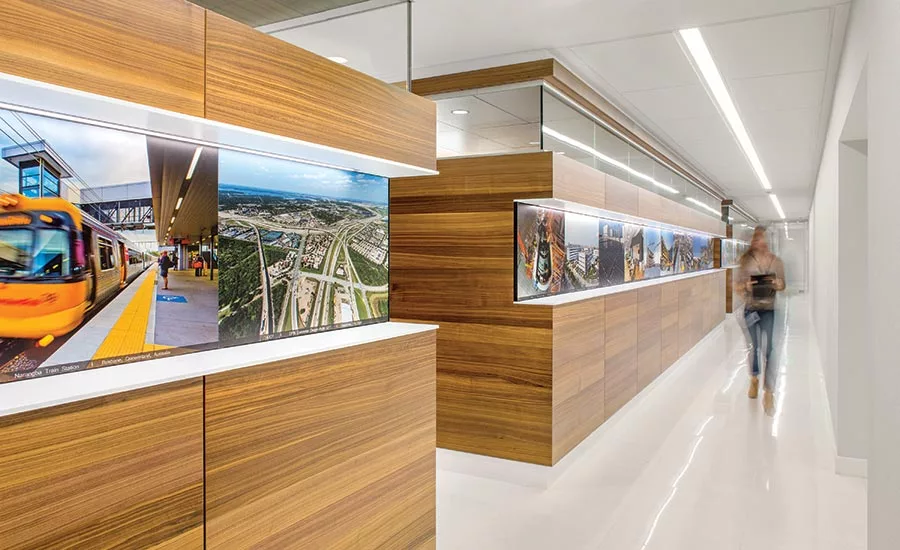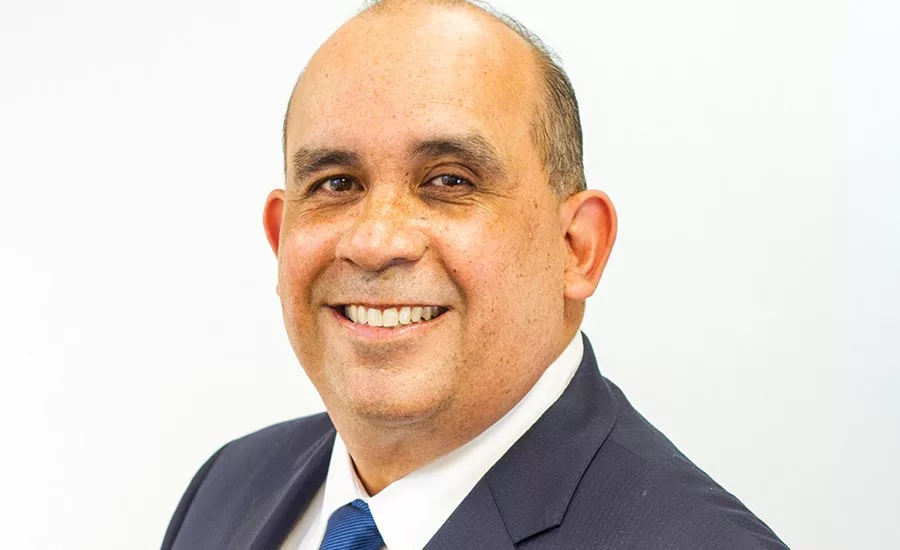BeyondZero: How Jacobs is Fostering a Culture of Caring
Jacobs is taking duty of care further by integrating their BeyondZero philosophy into every facet of the business.

Whether employees are traveling domestically or internationally, or just headed to their usual office, Jacobs takes their Culture of Caring seriously, driving duty of care from the executive suite down to each individual employee, contractor and visitor.
Photo courtesy of Jacobs Engineering Group

Harwood Center Tower in Dallas, Texas, is the headquarters for Jacobs. © Thomas McConnell

At Jacobs, the BeyondZero Culture of Caring is “everything to do with making your work life experience better, healthier, safer and more secure. It’s not something we do, it’s who we are,” says Joe Olivarez, Vice President of Global Security & Resilience. Olivarez was recently awarded the International SOS Foundation Ambassador of Duty of Care Award for his efforts in this area.
Image courtesy Joe Olivarez
In 2005, there was an industrial accident at a BP refinery in Texas City, Texas. The explosion killed 11 Jacobs Engineering employees, who were carrying out maintenance work at the time. Following the incident, Jacobs launched its BeyondZero® program designed to extend its safety culture outside the office, beyond the project site and into the cars, homes and communities of its employees. For Joe Olivarez, Vice President of Global Security & Resilience for Jacobs, that meant taking duty of care far beyond just safety policy and making it a way of life – the Jacobs “Culture of Caring.”
“One of the things we wanted to accomplish was to drive a new culture of BeyondZero,” says Olivarez, who came onboard at Jacobs in 2014. “What we mean by that is going beyond compliance, going beyond driving down statistics and company reportables, to really living the experience of everyone going home safe every day, and taking it beyond the walls of Jacobs – taking it to our clients, our visitors and the communities we live and work in… When I first came here, BeyondZero was more about safety, but now we’re talking about safety, security sustainability and mental health – it’s everything to do with making your work life experience better, healthier, safer and more secure. It’s not something we do, it’s who we are.”
Jacobs Engineering has more than 77,000 employees around the world, and in excess of 110,000 business trips are booked every year across the company, ranging from low-risk to high-risk endeavors as employees travel to support clients or to work in emerging markets like North Africa. The BeyondZero culture seeks to change the conversation around employee travel, starting with its necessity.
“We try to make people realize that travel itself is a risk,” Olivarez says. “So one of the things we try to drive for our culture is: ‘do you even have to travel in the first place?’”
However, most travel is project-related, requiring a Jacobs employee to be on the ground in the project location. Each project is evaluated to determine the risk from geography, the nature of the project, the current security situation in that country or region, what kind of security or emergency response capability is there, and what gaps might exist. Jacobs’ Global Security & Resilience department isn’t the only participant in this process, though.
360-Degree Culture of Caring
“A lot of what we do is setting a solid foundation and good travel policy, delivering appropriate and commensurate security and travel awareness, so people understand the expectation on them,” Olivarez says. “This is a 360-degree discussion – it’s not just the employer, it’s not just security and it’s not just the traveler; it’s all three together making sure trips happen safely.”
A large part of making sure those expectations are set and understood is the Travel Safety Plan. Every single trip an employee makes – regardless of risk level or location – is required to complete a plan, which is designed to get travelers involved and thinking about their own personal safety. The plan must include information on where they’re going, where they’re staying, whether they know the environment or have been there before, all their training details, contact information, the location of the nearest embassy or law enforcement location, the location of the closest hospital and whether they have the appropriate communication skills.
Once the traveler completes the plan, it must be approved. Depending on the travel location and risk level, it could be approved by their manager alone (low-risk trips); by their manager, the next level up manager and the host country (moderate risk); or both managers, the host country, Global Security and executive leadership (high risk).
Domestic travel is also included in this program, which helps reduce complacency regarding security in the U.S.
The Global Security team will occasionally perform self-audits, checking the number of trips against the number of Travel Safety Plans filed, and if a function or business unit isn’t fulfilling their role by filling out and collecting their plans, Olivarez and his team will respond and start proactively engaging with their respective leaders.
From the information in those Travel Safety Plans and risk assessments, security can begin crafting the appropriate education and awareness training.
Training at Jacobs can vary based on the trip, from basic personal safety and awareness to terrorism response to Hostile Environment Awareness Training (HEAT). High-risk trips include bespoke briefings, concept of operations plans and training for that particular trip – what the risk is in the host country, how you will enter, who will meet you, awareness at the hotel, awareness around transportation and training for an emergency.
Employees aren’t the only ones to receive training. Contractors and even visitors are given a BeyondZero briefing when they enter a Jacobs project site or facility, either by a security officer, receptionist or security manager. The training covers the basic safety of the project or office, with additional local information added in as needed.
Training is augmented by technology, including third-party programs such as Everbridge’s mass communications system, which is regularly leveraged to provide information to employees at home and abroad during events like hurricanes, travel disruptions or safety threats. Employees are trained on how to use the system – as well as a global crisis hotline – to get and send key information about their safety and security.
One issue that Olivarez stays mindful of is regulatory change and employees’ expectations when it comes to privacy of information and their contact details.
“We want to make sure we’re managing to the employee’s expectations around privacy but also make sure we can get them the right information at the right time in the event of critical issues,” Olivarez says. “The last thing you want is the inability to get people the right information after a significant terrorism incident, for instance, because you haven’t managed the privacy issue well, and people haven’t signed up to receive messages or haven’t given you their contact information. You have to demonstrate the value and be transparent on how you protect the integrity of their data.”
Keeping Up with a Faster Pace of Business
The Jacobs strategy for entering new markets has changed through the Culture of Caring perspective, ensuring the Global Security & Resilience team has the right amount of time and resources to truly understand emerging markets and conditions on the ground.
“One way to avoid being considered a one-off or a cost center is to really integrate your program with the business and embody it. That means taking the time and making one of your main priorities fostering relationships with business leaders in an effort to understand their business values and where they’re going,” Olivarez adds.
When Olivarez came into the Jacobs business, there were regions where the company did not operate or were reluctant to consider expanding into, and when asked why, the responses varied from vagueness to conflicting information on risk. By building relationships, aligning with the business and demonstrating the value of strategic risk analysis and sharing its relevancy to the company, it allowed for feeding more informed and growth-supported decision-making about emerging markets with company executives.
The Courage to Be Proactive
At Jacobs, the Culture of Caring is what pushes the Global Security & Resilience team to combine its traditional functional role with a more operational slant.
“You can’t embody the Culture of Caring perspective from your desk,” Olivarez says. “You really have to be out there, understanding your operations, understanding the context of how your projects are operated and what environment they’re in. The reason we are where we are as a company is our client brings us there – they want us to build a pharmaceutical plant, they want us to build a bridge, they want us to build a dam, they want us to build a refinery. We’re there because of them, so it is very critical to our duty of care to understand our client.”
That understanding also brings additional perspective when it comes to risk. Sometimes the nature of the client or the project can create additional challenges, or the client’s capabilities to provide security and safety in a region falls short of Jacobs standards, so Olivarez and his team supplement those services.
“We must have the courage to say ‘This isn’t right, we can improve in this area; we need to strengthen this or add resources here. We need to think differently.’ I think this is a differentiator for Jacobs because we are thoughtful about these things, and we’re looking at it from a global perspective, leveraging more than 70 years of professional services experience,” says Olivarez.
“The important thing for all of us, from a security leadership perspective, is to not get caught up in the program, but to use your time to cultivate your culture. A Culture of Caring, for me, means we’re going to do the right thing, the program will be ethical, and we will recruit talent with the same genuine values.”
Looking for a reprint of this article?
From high-res PDFs to custom plaques, order your copy today!




.webp?height=200&t=1714748912&width=200)



